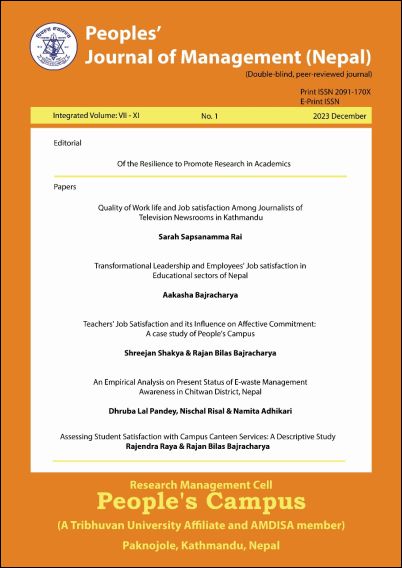An Empirical Analysis on Present Status of E-waste Management Awareness in Chitwan District, Nepal
DOI:
https://doi.org/10.3126/pjm.v11i1.63168Keywords:
E-Waste, Market Penetration, Replacement Market, Obsolescence, E-Waste Management AwarenessAbstract
The study aims to assess the current status of E-waste management awareness in Chitwan District. The electrical and electronic waste (e-waste) is the fastest growing waste rivulets in the world. The increasing “market penetration” in developing countries, “replacement market” in developed countries and “high obsolescence rate” make e-waste as one of the fastest growing waste streams. Environmental issues and trade associated with e-waste at local, national and international level have driven many countries to introduce interventions. It has become an urgent need of the hour to know the awareness level of e-waste management at Chitwan. The exploratory and descriptive survey research method have been adopted in the study. The responses have been taken from the people of Chitwan using convenient sampling method. The survey research design has been used in the study. The 5-point Likert scale has been used to measure the awareness of e-waste management in Chitwan district. The study concluded that e-waste management awareness is mainly important because a few electronic and industrial elements are difficult to dispose of or recycle. When it comes to e-waste, it is important for people to be aware of the increasing threat and secure disposal and their impacts on socio-economic values as well as health and environment. A growing amount of e-waste is not considered to be products that have stopped working or become obsolete. Technological advances are coming at us at such a dizzying speed that a lot of electronic devices that still work fine are the ones considered obsolete. The main finding of this study is that the respondents consider e-waste management as an eco-friendly practice. Government of Nepal does not have adequate managing policies regarding e-waste. The study has been focused to understand the e-waste recycling status in Nepal and the concept of 3R’S (reduce, reuse and recycle) should be implemented as soon as possible.




